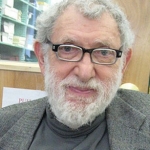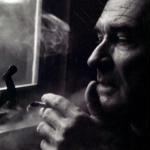On the Memorial building's
Terrace the sun has been buzzing
Unbearably, all the while
The white baking happens
To the shadow of the table's
White-painted iron. It darkens,
Meaning that the sun is stronger,
That I am invisibly darkening
Too, the while I whiten.
And only after the stretching
And getting up, still sweating,
My shirt striped like an awning
Drawn on over airlessness;
After the cool shades
(As if of a long arcade
Where footsteps echo gravely)
Have devoured the light;
Only after the cold of
Plunge and shower, the pale
Scent of deodorant stick
Smelling like gin and limes,
And another stripy shirt
Can come, homing in at last,
The buzzing of having been burnt.
Only then, intimations
Of tossing, hot in the dark
night, where all the long while
Silently, along edges,
There is flaking away.
In this short while of light
My shadow darkens without
Lengthening ever, ever.


















Comment form: